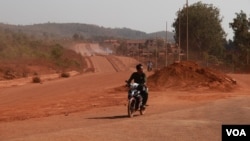Residents of Mondulkiri province are hoping a new section of road will bring improved livelihoods, but they are also concerned about protecting their communities from over-development.
A new road, 67 kilometers of it, would cut through forest land inhabited by many indigenous communities, who worry their traditional way of life will be damaged, as it wends through this northeastern province toward Vietnam.
A few weeks a go, a small group of people were gathering in a village in Pech Chreada district, to discuss ways to improve their livelihoods and protect their community. The road, if built, will cut through their forest, which is home to wild animals and other resources that provide a daily living for people here.
“The chief did not let me know about the project,” Chaing Sarin, deputy village chief in Krang Tes commune, said of the road project. “It will affect the animals, bees and other wild animals, such as wild buffalo, gaur, ansaong, and other wild animals living in the protected area. It’s a community forest.”
Kras Teunh, commune councilor and community leader, said he worries people will lose their sources of income if the road destroys too much forest. That includes the collection of rattan and vines for handiwork.
Chhit Sam Ath, country director for the World Wildlife Fund, said that if forests are cleared to make roads, that could lead to more illegal logging and wildlife trafficking, creating an ecological loss.
“It will cut through Mondulkiri’s protected forest, the core and the filter zones,” he said. “The area is a good area for elephant, gaur, and banteng navigate through. We’re worried, if the road is to be built.”
“It is an area full of potential that would be able to bring back tigers, and it is full of biodiversity,” he said.
Besides, he said, the road is not necessary. There is already a road not far from here that connects to Vietnam.
Villagers living in Pech Chreada say the road could ruin their livelihoods. And they are upset they were not informed of the project.
Teirn Leirp, the leader of forestry community in Krang Tes commune, said he knows for sure the road will be more benefit to outsiders than people living here. More road means more noise, and that will frighten the animals, he said.
“The bigger the road the bigger the problem will be,” he said. “The benefit to the locals to travel is not much, but mostly for those who are trading, working for companies searching for mines, more than to the people.”
The road does have some support, even if not everyone is fully aware of its status.
Treck Phon, chief of Krang Tes commune, said that he was not informed about the road, but he said that a road is needed here for development. “It is not a project on the commune level,” he said. “It’s a project between the government and abroad. It’s at the provincial and the national level.”
Deputy Governor Svay Sam Eang said that the road is needed to connect to Vietnam’s Dalat province, to boost trade between the two sides.
“With Dalat, we have not had the road there to be connected yet,” he said. The road will be built to minimize its effects on the forest, he said. “There will be an effect. But we are studying to avoid a negative effect.”
For some living here, the road could be a good thing. Him Sros, in nearby Pou Chrei commune, said she would in part be happy to see a road coming, which would make it easier for her children to get to school. But she’s not sure it’s worth the trade-off.
“I’m happy, since my kids have to go to school,” she said. “But I’m worried too that there might be no rain if there are no trees. If there are no trees, it’s going to be hard for us. Maybe it’s not right to build.”





